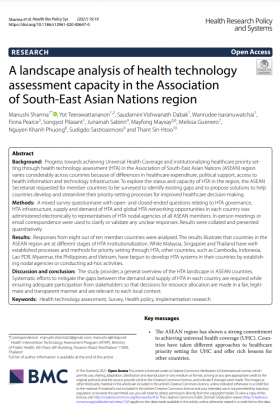This website uses cookies so that we can provide you with the best user experience possible. Cookie information is stored in your browser and performs functions such as recognising you when you return to our website and helping our team to understand which sections of the website you find most interesting and useful.
A landscape analysis of health technology assessment capacity in the Association of South-East Asian Nations region

รายละเอียดเพิ่มเติม
Abstract
Background
Progress towards achieving Universal Health Coverage and institutionalizing healthcare priority setting through health technology assessment (HTA) in the Association of South-East Asian Nations (ASEAN) region varies considerably across countries because of differences in healthcare expenditure, political support, access to health information and technology infrastructure. To explore the status and capacity of HTA in the region, the ASEAN Secretariat requested for member countries to be surveyed to identify existing gaps and to propose solutions to help countries develop and streamline their priority-setting processes for improved healthcare decision-making.
Methods
A mixed survey questionnaire with open- and closed-ended questions relating to HTA governance, HTA infrastructure, supply and demand of HTA and global HTA networking opportunities in each country was administered electronically to representatives of HTA nodal agencies of all ASEAN members. In-person meetings or email correspondence were used to clarify or validate any unclear responses. Results were collated and presented quantitatively.
Results
Responses from eight out of ten member countries were analysed. The results illustrate that countries in the ASEAN region are at different stages of HTA institutionalization. While Malaysia, Singapore and Thailand have well-established processes and methods for priority setting through HTA, other countries, such as Cambodia, Indonesia, Lao PDR, Myanmar, the Philippines and Vietnam, have begun to develop HTA systems in their countries by establishing nodal agencies or conducting ad-hoc activities.
Discussion and conclusion
The study provides a general overview of the HTA landscape in ASEAN countries. Systematic efforts to mitigate the gaps between the demand and supply of HTA in each country are required while ensuring adequate participation from stakeholders so that decisions for resource allocation are made in a fair, legitimate and transparent manner and are relevant to each local context.




